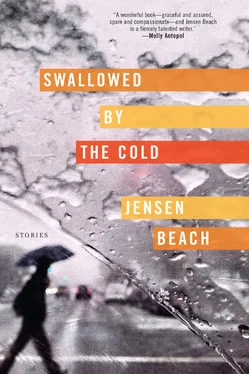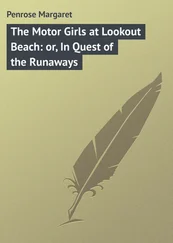The drawbridge rose. He watched this and thought about what to do. He could try to walk back across the bridge. Maybe he would find the tennis pro on the other side. The tennis pro would know what to do. Lacerations to the head can tend to appear more dangerous than they actually are. Even minor wounds might produce a frightening amount of blood. He probably only needed stitches. Rolf was confident in his body’s overall conditioning. He’d just defeated a former tennis pro in four sets.
The sailboat, which had now made its way past the drawbridge, motored steadily up the canal toward him. He could hear voices. There was a slight wind, about five knots if he had to guess. He lifted his free hand. “Hello there,” he whispered. He didn’t mean to whisper, but his throat was beginning to feel constricted and the shout he tried to produce came out in a wet, phlegmy whisper. There were two men and two women all standing in the cockpit. They were tanned and attractive in their shorts and bikinis and sun hats. It was a nice-looking boat, he thought, expensive. He listened to the clean and steady sound of the engine. His left arm felt as though there were an electrical current running through it. He cleared his throat and called out to them again: “Hello there!” The sailboat’s pilot appeared to notice that one of the women was pointing at Rolf. The pilot said something to the others. They all looked at Rolf. Rolf waved. He pointed to his bloody T-shirt, then stuck out his pinkie finger and his thumb in what he was sure was the symbol for phone, and held his hand up to his head. The electricity buzzed in his arm and now also in his neck. The passengers waved at him, but the boat didn’t slow. He watched the sailboat drift away. On the stern, spelled out in golden letters: Angelika . He thought for a moment about this name and the beautiful lettering. He wished he were on board the Angelika . It was a perfect day, he thought, as he started to lose consciousness, for sailing. “Don’t go,” he said. Rolf Strand fell to his side, put his head down on his blood-soaked T-shirt, took one or two shallow breaths, and was dead.
Henrik Brandt tied his sailboat to the mooring ring in the canal. The ring was rusty and drilled into a large stone that stuck out into the canal at such an angle that he’d worried, the first several times he made the trip through the canal, that it would cause an accident. It was one of the first pleasant days of the season. Motorboats, and sailboats, and a handful of kayaks stretched from one side of the narrow canal to the other. For the most part, the people on these boats seemed to enjoy the wait. They laughed and shouted from boat to boat, gossiping about village news. A family from the south of Sweden had recently bought the old Gustafsson place and sold off a dozen acres of the eastern pasture to a developer. The pasture sat up on a small bluff and there were excellent views of the Baltic. It was only a matter of time until the island was overcrowded. Everyone on the canal was convinced of this. Henrik held the rope against the rocking boat. On the mainland side of the canal was the tennis court where the previous summer he’d lost to his wife in three humiliating sets. Even now he felt humiliated. Partly, this was because he liked playing tennis and had, the afternoon his wife beat him so resolutely, made such an ordeal of the loss that he hadn’t played again out of embarrassment, and partly because it shamed him to remember how dreadfully he’d acted. It was a game. He lost. There was nothing wrong with losing at tennis to your own wife. But still he hadn’t played in over a year. Slowly, he’d grown accustomed to this and had turned his attention to other activities. That summer, he and Lisa had taken their bikes out almost daily and ridden to the fisherman and back in the early morning fog. He’d been sailing the boat more frequently than in previous summers and had once or twice considered taking up kayaking. Henrik hadn’t let himself watch the French Open that year, and he hadn’t once glanced at the supplement in Dagens Nyheter about the Swedish Davis Cup team. Tennis was eroding from his life.
Much had changed for Henrik recently. Within the last five years, he’d left his job at Nordea Bank and taken a new position at a law firm, which tripled his salary and allowed him to buy a summerhouse on the eastern shore of the island, a few miles from the village. When he bought the house, he had a dock built, at the end of which he kept his sailboat, the Angelika —so named for his oldest sister, who’d died from leukemia when Henrik was six. On the day that the marina determined every fall, Henrik sailed his boat south to Norrtälje and paid the crane operator to lift the Angelika into dry storage. He enjoyed sailing, although he wasn’t particularly good at it. Since the previous September, Henrik had been sleeping with a colleague’s wife. This colleague’s name was Peter, and Henrik had invited him and his wife, Helle, out for a week at the house. He and Peter were not especially close at work, but he wanted to see Helle. It was the last week of June and soon the whole country would be on vacation. He thought they might sail to Finland if conditions were good.
Peter and Helle arrived on Friday and the four of them spent the weekend walking the trails on the interior of the island, waiting out the weather. Henrik was an inexperienced sailor and it was windy.
During the Cold War, the military built a series of bunkers along the water on the island’s eastern shoreline, all of which were now abandoned and derelict. Henrik and Peter spent much of Monday afternoon trying to pry open the thick metal door of the bunker nearest the house. They were mindful of snakes. The wind blew salty air at their faces, carried to their ears the arguments of the birds out on the thin tombolo, which connects the island to a large rock Henrik had been told was called Bull’s Head. Henrik cut his hand on a jagged piece of metal that was obscured by a patch of thick brush. The wound was deep and bled profusely. He didn’t believe he needed stitches and his tetanus was up to date, so when he and Peter returned to the house, Henrik asked Lisa to clean and dress the wound but he disagreed with her suggestion to drive to the clinic in town.
The following day, Tuesday, the wind calmed. They left at ten, taking with them a picnic of sandwiches and freshly boiled new potatoes, which they ate cold with sour cream. By the early afternoon they’d made it to the southern entrance of the canal. Henrik chose to go north up the canal to get back to the house rather than backtrack around the island’s southern tip. He was eager to motor for a stretch, draw in the sails, uncomplicate his day. Elmsta was pretty from the water. They were unlucky with the drawbridge.
He watched the clock count down the minutes until the drawbridge rose. The cut on his hand stung and he concentrated on this. Lisa had helped him rebandage his hand that morning. A man on a bicycle stopped on the bridge, peering down at them. Henrik couldn’t see the man well enough in the bright sun to recognize him but the stark shadow of his posture up there on the bridge struck Henrik as familiar and a little bit sad. There were dozens of sad old men on the island. It could have been any of them. Before he was able to get caught thinking endlessly about it, he was distracted by his wife and Helle. Helle and Lisa were talking about a movie they’d both recently seen. The movie had made them both cry and they were sharing this, eagerly admitting to tears. On the mainland side of the canal, near the concrete pylons, Henrik watched a man fish. The gossip between the other boats had quieted, and many people sat with their feet in the water, impatiently splashing. After a quarter of an hour, the traffic signals on the island and the mainland flashed red and the large gears beneath the arms of the bridge became visible, articulating upward. A bell sounded. Henrik let the bridge reach at least sixty degrees before he passed beneath it. It seemed only reasonable.
Читать дальше











